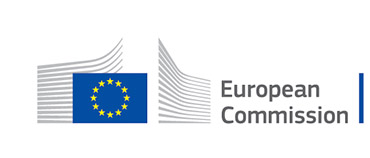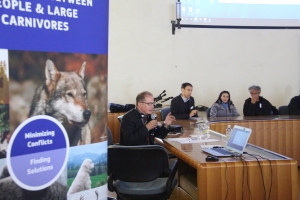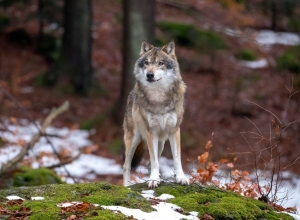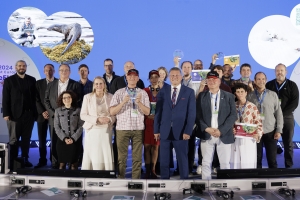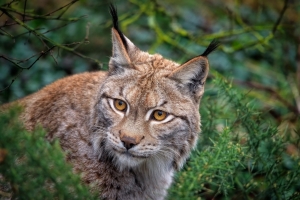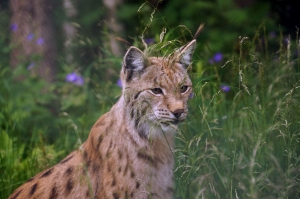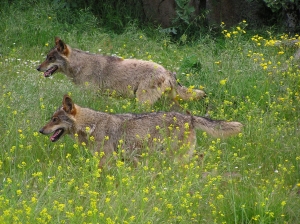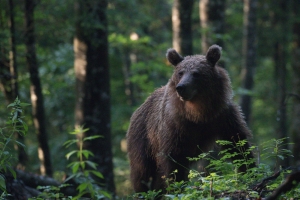|
|

|

|
| |
|
|

|
EU Platform on Coexistence between People & Large Carnivores
E-Newsletter | 2024/01 (June 2024)
|
|
|
|
|
|
|
|
|
Editorial
|

|
|
Near the eve of the European elections, the EU Platform on Coexistence between People and Large Carnivores met for the eleventh time, bringing together platform members, DG ENV, DG AGRI and LIFE project managers both online and in person in Brussels.
In the context of a new European Parliament with changing priorities, and with continued interest from all parts of the political spectrum in the protection status of the wolf, the platform, promoting dialogue between interest groups with varying viewpoints, remains more critical than ever. At ELO, we were delighted to be re-elected as chair to continue promoting informed discussion.
The European Commission has also signalled their continued support for dialogue on coexistence with large carnivores by financing a new contract aiding the platform’s work. New data on large carnivore distribute, conservation status and impact will be collected to support informed discussion. At the same time, a range of local, national and translational dialogue platforms are taking the EU Platform as a model to encourage mutual understanding between different groups.
We hope that these types of dialogues on large carnivores, and other policy topics can help reduce divisions in society and encourage us all to keep the door open to debate and understanding one another’s situations.
Jurgen Tack
Scientific Director of the European Landowners’ Organization (ELO)
Co-chair of the EU Platform on Coexistence between People and Large Carnivores
|

|
|
|
|
|
Highlights
|

|
Large Carnivore Platform Plenary Meeting 2024
|
|
|

|
|
The 11th meeting of the EU Platform took place in Brussels on 5 June 2024. Platform members came together to discuss the latest related policy events as well as ongoing LIFE projects. They gained insights into the additional tasks carried out under the new EC Large Carnivore support contract, such as communication activities, data collection and the update of large carnivore distribution maps. Another focus was on the LIFE WolfAlps EU communication products and their further use. European Landowners’ Organisation was universally re-elected by consensus as co-chair of the EU Platform.
More detailed information can be found on the large carnivore website.
|

|
|

|

|
Establishment of new regional and local platforms
|
|
In 2024, six new platforms joined the EU regional platform grouping. Three local platforms are co-organised with the LIFE WildWolf project in Croatia, Czech Republic and Portugal. In Greece, a national level platform is being established, while in France, the collaboration in the Vercors is being built upon by engaging the network of regional parks nationally. The Dinaric-Balkan-Pindos Platform continues with additional support from the regional platforms.
Of the original six platforms, the Harghita platform (Romania), the Vercors platform (France) and the Swedish platform continue their work.
|

|
|
|
|
|
Latest News
|
|
|

|

|
Natura 2000 Award Ceremony
|
|
|

|
|
The Natura 2000 Award celebrates excellent initiatives linked to Natura 2000 sites across the EU. On May 29, the European Commission held the Natura 2000 Award ceremony. The high-level Jury chose the winner for each of five different categories, and the winner of the European Citizens’ Award was chosen by the public. For more details on the event and photos, you can visit the official ceremony page here.
The Polish initiative to protect the black stork came in first for the Natura 2000 Citizens' Award, closely followed by the Belgian Wolf Fencing Team for promoting peaceful coexistence with wolves, a Natura 2000 Award finalist in the category "Working together for nature".
The Wolf Fencing Team Belgium supports livestock owners since 2019 by providing practical help in setting up appropriate fences to prevent wolf attacks on livestock as well as providing expert advice such as on fences’ maintenance. The initiative has not only directly led to reduced conflict around the wolf in Belgium but also convinced a broader European public that cast their vote for this project.
|

|
|

|

|
Iberian lynx makes recovery
|
|
The population of the Iberian lynx has been recovering and according to the International Union for the Conservation of Nature (IUCN) has now moved from “threatened” to “vulnerable” status. However, this means that it is still at risk of extinction, even if to a lesser extent. This positive development was also made possible due to EU financial support primarily via a series of LIFE projects over the past 20 years, such as LIFE Safe-crossing (2018-2023) or LIFE LynxConnect (2020-2025) and celebrated last week in the Spanish senate (also see below section "Large carnivore projects").
The Iberian lynx (Lynx pardinus) is a species of "community interest" strictly protected under the Habitats Directive. EU Member States have committed to restoring and maintaining their populations to a "favourable conservation status" (FCS). However, at this moment the species is still assessed by Member States and the EEA as unfavourable with positive trends.
While the positive trend in the red list status of the Iberian lynx means that it is no longer at any immediate risk of global extinction, it has not yet achieved the FCS under the Directive. As a 'priority species' under the Habitats Directive, potential LIFE projects on the Iberian Lynx are entitled to the highest possible co-funding rate for LIFE Nature projects, currently set at 75% and that could support the species in reaching FCS.
|

|
|

|

|
New CDPNews website launch
|
|
Carnivore Damage Prevention News (CDP News), a professional newsletter on the coexistence challenges between large carnivores and human activites, recently launched their new website. The newsletter can be found in form of a downloadable PDF of the whole issues or individual articles with the latest edition focussing on bears in Europe and Asia.
|

|
|
|
|
|
Publications in the spotlight
|
|
|
|
|
Large carnivore projects
|

|
LIFE LynxConnect
|
|
Thanks to the LIFE LynxConnect projects' efforts, the Iberian lynx population has grown to more than 2000 individuals since work begann in 2002 to prevent the extinction of the species. The project has also begun recording a series of twenty podcasts on the history of Iberian Lynx conservation over the last twenty years.
More information on the 2023 Census and the work carried out by the partners of the project can be found here.
|

|
|

|

|
LIFE Lynx
|
|
|

|
|
After six years, the LIFE Lynx project came to an end at the end of March this year. It achieved its goal to successfully translocate 18 Carpathian lynxes to Slovenia and Croatia, with 12 released in the Dinaric Mountains and six in the Slovenian Alps. A report on the translocation success of the project was published in March 2024.
The LIFE Lynx Layman’s report summarizes the essence of the project for the general public. Additionally, two reports on the project’s reintroduction activities in the Dinaric region and the South-Eastern Alps were published.
|

|
|

|

|
LIFE LYNX-PL-LT-DE
|
|
The main objective of this new project is to improve the condition of the Eurasian lynx at the edge of its natural range in Poland and to resolve identified problems and threats. The lynx population range will be restored in the area with the best habitat conditions, to preserve the ecological connectivity in the lowland part of Poland spanning the Northern Ecological Corridor, towards Lithuania and Germany.
|

|
|

|

|
LIFE LUPI-LYNX
|
|
In January, the cross-border LIFE LUPI-LYNX project officially started. It aims to expand the habitats of Iberian wolves and lynxes in Spain and Portugal. The project, led by Rewilding Portugal with several partners, focuses on improving ecological conditions and fostering positive relationships with local communities to support the animals' return.
|

|
|

|

|
LIFE WolfAlps EU
|
|
|

|
|

|

|
LIFE WILD WOLF
|
|
The LIFE WILD WOLF project kicked off at the beginning of this year by 18 international partner institutions. Its goal is to provide a contribution to the most adequate management of critical situations where wolves approach humans in urban and peri-urban areas. The project will be implemented in rural, urban and peri-urban areas of eight EU countries (Croatia, Germany, Greece, Italy, Portugal, The Czech Republic, Slovenia and Sweden). The partnership is coordinated by the Italian Instituto di Ecologia Applicata of Rome.
|

|
|

|

|
LIFE BorealWOLF
|
|
As part of the LIFE BorealWOLF project, two tools have been developed to collect information and assist authorities in assessing various measures and tasks related to wolves. For example, the interactive multi-species' game illustrates the impact of different measures, such as a hunting stop, on the dynamics of deer and large carnivores’ populations. The second tool assists authorities in wolf-related wilderness supervision.
|

|
|

|

|
LIFE VARNA PAŠA (Safe Grazing)
|
|
The project started at the beginning of this year (2024-2029) and is coordinated by the Slovenia Forest Service. It focusses on conflict prevention and acceptance in the Alpine and Dinaric regions of Slovenia, and the eastern lowlands, where wolves are expanding (areas not yet prepared for the presence of carnivores).
It will assess the success of the existing RDP measures for preventing wildlife damages, improve and adapt these measures to specific contexts and foster their application (e.g. adapt new tools specific to the more challenging mountain terrain characteristic of the Alps, a “bear alert” system for beekeepers, an electric fence rental system). Then it will integrate the tested and adjusted measures into a new RPD programme.
The measures the project will focus on and improve because insufficiently or not properly adopted are: the availability and quality of livestock guarding dogs; shepherding; electric fences; control mechanisms and governance of administrations at different levels (institutional level); capacity building for farmers, beekeepers and officials.
|

|
|

|

|
LIFE Bear-Smart Corridors
|
|
This project is designed to transfer a model of positive coexistence successfully developed in North America to Europe (Italy, Greece), called “Bear-Smart Communities” (BSCs). It is based on the creation of a community of stakeholders that collectively develops and practices specific management actions to improve coexistence with bears. 5 BSCs are currently operating in central Italy so far and 2 in Greece after the signature of the Memorandum of understanding with interested Municipalities. The most recent signatures (end of May 2024) were broadcasted on the news (only in Italian).
Meeting are already being held in both countries to trigger initiatives according to each area's needs. The guidelines for the development of BSCs can be found here.
|

|
|

|

|
Interreg project LECA
|
|
In the scope of the Interreg project LECA, the first joint conference of the Alpine and the Carpathian Conventions on large carnivore management was held in Slovenia between 6-8 March 2024. Representatives from 13 countries exchanged their experiences and activities in the field of large carnivore management. The conference facilitated discussions on shared challenges and differences in management practices at regional and national levels.
|

|
|
|
|
|
Good practice example in focus
|

|
Each newsletter presents another best practice example highlighting successful projects and initiatives that foster coexistence between people and large carnivores.
|
Monitoring the status of Carpathian lynx | Slovakia and Switzerland
|
|
|

|
|
This project established a collaboration between Slovakia and Switzerland to enhance lynx populations' genetic diversity and health. The focus was on monitoring and improving the status of lynx populations, initially reintroduced from the Carpathian region to central Europe. The reintroduced populations in Switzerland exhibited genetic problems due to inbreeding.
The project began with comprehensive monitoring of the Slovak lynx population. This included adapting Swiss systematic monitoring methods to the Slovak Carpathians, execudted by the Slovak Wildlife Society in partnership with KORA and Bojnice Zoo. Key actions included 60-day camera trapping sessions, snow tracking, and DNA sampling to estimate lynx abundance and assess genetic diversity. Local stakeholders such as hunters and foresters participated in these fieldwork activities. The project also emphasized education and professional training. Reports were produced for wildlife authorities, and training events were organized to transfer Swiss expertise to Slovakia. Public awareness was raised through education programs, teacher manuals, and exhibitions. Workshops and seminars in both countries focused on rigorous necropsy procedures and unified working protocols.
The project yielded significant results, including 843 lynx images captured and the identification of individual lynx in two reference areas. Genetic analysis indicated no significant inbreeding. Educational and training programs reached thousands of participants.
Find out more about the case studies collected by the EU Platform here.
|

|
|
|
|
|
Check your facts
|
|
|

|
|
The Common misconceptions section of the EU Large Carnivores website provides a list of common questions on the presence of large carnivores in Europe. Here we select one to present in the newsletter, others are available online.
Common misconception: Wolves have been reintroduced to Europe
Wolves have returned naturally across the EU. The increase of wolf populations and range in Europe is due to natural processes including dispersal of new individuals; re-colonization of former (historical) range and establishment of meta-populations. Only in Finland have wolves occasionally been translocated across the country to avoid the Swedish population becoming genetically isolated (wolves are hunted in the Reindeer Herding Area located between the two countries and therefore cannot pass through easily).
While wolves have never been reintroduced, in a few cases bear populations have been augmented through population restocking-reintroduction (e.g. in Trento, Italy or the French Pyrenees). Reintroductions have however, been used most with lynx which does not naturally migrate easily (e.g. Switzerland, France, Germany).
|

|
|
|
|
|
Large Carnivore Platform participation at events
|

|
Dinaric Balkan Pindos Platform 5th Conference | Bulgaria
|
|
|

|
|
The 5th conference of the Dinaric-Balkan-Pindos Platform took place from 11-13 June 2024. It was hosted by the Bulgarian Ministry of Environment and Water and the Bulgarian Forest Agency in collaboration with the EU Platform on Coexistence with people and large carnivores, the Bern Convention Secretariat and supported by the Union of Hunters and Anglers in Bulgaria and WWF Adria. It was supported by the EU Platform as a regional workshop.
Topics of discussion included updates on large carnivore management, thematic debates on livestock and land use conflicts, and the role of hunters in conservation efforts. Participants had the opportunity for further exchange during networking opportunities as well as explore Vitosha Natural Park on a guided field trip.
More detailed information can be found on the event page.
|

|
|

|

|
LIFE WolfAlps EU – final conference | Italy
|
|
The final WolfAlps EU conference took place from 17-19 May in Trento and was attended by 230 participants on-site (1940 participants online). Over three days, the project staff presented the achievements of the project and discussed future perspectives. Presentations were given by the European Commission and the EU Regional Platform Secretariat. The event covered topics such as EU policy developments, transboundary monitoring, wolf-dog hybridization, and educational initiatives for wolf conservation in the Alpine region. It also explored the role of wolves in ecotourism and emphasized stakeholder engagement and the importance of combatting illegal wildlife poisoning.
More information on the event can be found here.
|

|
|
|
|
|
Upcoming events
|
|
|
About this Newsletter
This newsletter is issued twice a year and produced by the EU Large Carnivore Platform Secretariat (adelphi consult GmbH and Callisto) on behalf of the Platform members. It aims to present the Platform’s work to the public.
The newsletter does not necessarily reflect the official view of the Platform members or the European Commission.
Visit the EU Large Carnivore Platform
Subscribe | Unsubscribe
|
The European Commission is committed to personal data protection. Any personal data is processed in line with the Regulation (EU) 2018/1725. Please read the privacy statement.
|
|
ISSN: 2599-8226
|
|
 |
|
